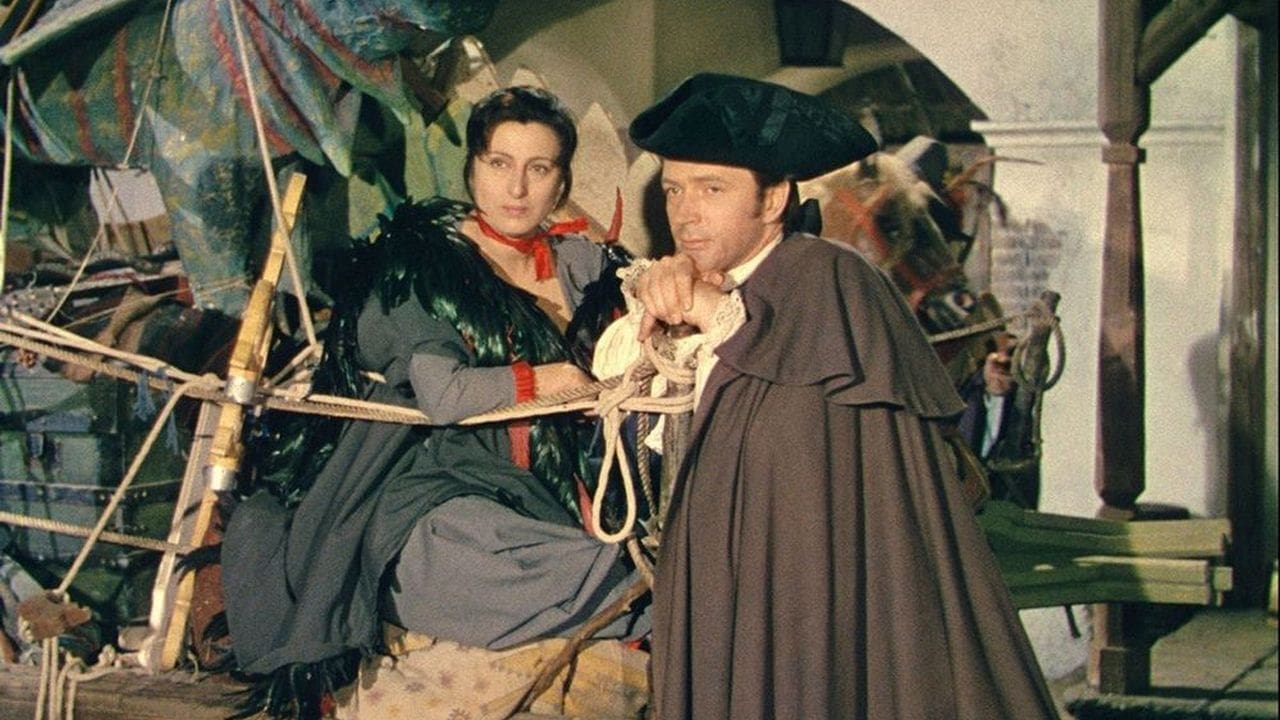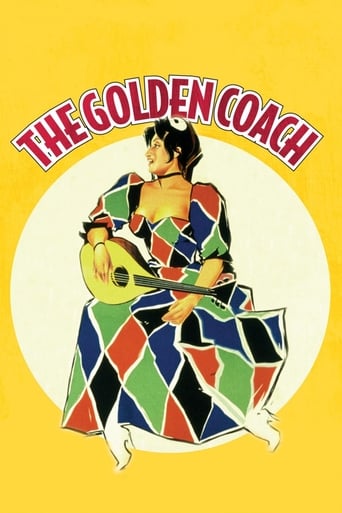

A Brilliant Conflict
... View MoreFun premise, good actors, bad writing. This film seemed to have potential at the beginning but it quickly devolves into a trite action film. Ultimately it's very boring.
... View MoreActress is magnificent and exudes a hypnotic screen presence in this affecting drama.
... View MoreClose shines in drama with strong language, adult themes.
... View MoreYou would think that 'The Golden Coach' has the potential to be a classic. After all, it's directed by the great Jean Renoir, the setting is unique (a Spanish colony in Peru in the 18th century), the plot is unusual (a commedia dell'arte troupe must prove its mettle in a potentially hostile environment) and the protagonist played by Anna Magnani, lends her star power to the proceedings.I like how the character of Ferdinand the Viceroy (in perhaps Duncan Lamont's greatest role) is not your typical autocrat who is bent on making everyone's lives, miserable. Quite the contrary, the Viceroy is beholden to the aristocracy who eventually decide to vote him out after he chooses to give the Golden Coach to Camilla (Magnani), who he has fallen in love with. I also like the witty banter between Lamont and Magnani, as he tries to seduce the headstrong Camilla.As the plot develops, the Viceroy isn't the only fellow who has fallen in love with Camilla. There's also Felipe, who's been accompanying the theater troupe in their travels. Felipe flips out after the Viceroy gives Camilla a very expensive necklace and there is a rather unfunny scene (that goes on for too long) with Felipe attempting to take the necklace away from Camilla and give it back to the Viceroy. The brawl between the two, emphasizing Felipe's extreme jealousy, is way overdone. The result in the plot is that Felipe decides to leave the troupe and join the Army.Then there's Ramon, the bullfighter, who's also smitten with Camilla. And naturally he's the extreme jealous type too. He ends up fighting with Felipe after his return for a visit and we're again expected to laugh simply because of both their jealous infatuations.Magnani knew no English when she was hired for the role and it's remarkable how fast she learned the language. Nonetheless, I'm not completely sure if she was the best type for the role. The three men are infatuated with her but certainly not for her looks. I guess it's her personality that sways them but in real life, can you imagine all three men going after such a brash (and not that physically attractive) type of woman?'The Golden Coach' denouement reminds me of the similar denouement in Moliere's 'Tartuffe'. You'll recall that it's the King who makes everything right at the end; similarly here it's the Bishop, who accepts Camilla's gift of the coach and plans on using it to transport sacraments to the sick and dying. Maybe that's Pope Francis' style now but back then, highly unlikely (same for the king in Moliere's day— can you really believe he would have seen through the hypocrite Tartuffe and restored equilibrium to Orgon and his household?). But the ending is designed to reflect the type of drama of that time. Ultimately, 'The Golden Coach' is a sumptuous costume drama with a unique, historical setting. If you like the commedia dell'arte, you'll certainly be rewarded (in terms of drama, it seems awfully dated to me).I understand that Renoir himself was more proud of the stage design than the narrative. And what of the narrative? It mainly relies on the comedy of three infatuated men and their extreme jealousy. Funny? Not really. Original? Ditto! There's also a little of Renoir's philosophizing at the end where we're reminded that Camilla really can only realize her true self when she's performing on the stage. Thus the machinations offstage are of secondary importance. This seems prophetic as those machinations do indeed seem trivial at best.
... View MoreIt was very interesting to read that French director Jean Renoir (Boudo Saved from Drowning, La Grande Illusion, La Règle Du Jeu (The Rules of the Game)) made this film in the English language, he planned to make a French version but had no money to do it, so this the original that all the critics praise. Basically set in 18th Century, in a small Central American town in Peru, a travelling Commedia dell'Arte theatre company arrives to entertain the people and the high society aristocracy. The chief aristocrat of the town is the Viceroy (Duncan Lamont), who has recently bought a fabulous golden coach from Europe to give to his mistress. But this plan changes when he gets to to know the leading lady and actress of the troupe, Camilla (Anna Magnani), he falls in love with her and gives the coach to her instead, and she starts to become accustomed to the high life. She is however also loved by the troupe leader and the local toreador (bullfighter), and the situation becomes a problem for the Viceroy who has his minsters shocked with his reckless extravagance and plan to get rid of him. In the end Camilla solves the situation by donating the coach the Bishop of Lima, and she returns to the theatre troupe and there is a big celebration for their preponderance. Also starring Odoardo Spadaro as Don Antonio, Nada Fiorelli as Isabella, Dante Rino as Harlequin, George Higgins as Martinez, Ralph Truman as Duke, Gisella Mathews as Marquise Irene Altamirano, Raf De La Torre as Chief Justice, Elena Altieri as Duchess Paul Campbell as Felipe and Riccardo Rioli as Bullfighter. It was handy that I did not have to read any subtitles through the film, the cast were all fine, especially Magnani who was radiant as the performer turned unlikely high class socialite of sorts, the story was just about simple enough that I could pay attention to the right parts, the costumes and use of colour is lavish, it feels like a play on stage, I'm sure that was the point, a likable period drama. Very good!
... View MoreFor the first 102 minutes, I saw this film much as MATTHEWSCOTT8: a pleasant movie that was charming and colorful, but otherwise ordinary. The final minute, however, is transcendent and elevates the entire work to something else. (The only other example of this I can think of is John Huston's "The Dead" where the final voice over forces you to reevaluate everything that have come before in a new light).Here is one interpretation of the the events of the last minute and their meaning:A player steps to the edge of the stage, beyond the curtain. He reveals the cosmological structure of this play within a play within a film. The first play is the "real world" where ordinary events occur and characters interact. Most pursue some narrow selfish objective, but on rare occasions one overcomes their greed and achieves a degree of liberation and fulfillment (in this case Camilla).The second play is the stage on which the our narrator stands; a kind of Bardo between the fist play and our audience. The audience is a sea of human souls - all those who have passed away as their personal play has ended.The narrator tells us that Camilla is missing. In the background we see her pale ghostly image as she bids farewell to remaining cast members.The narrator then gives us his philosophy of life, "Don't waste your time on the so called real life. You belong to us"..." the only way to find happiness is on any stage"... "during those two little hours when you become another person; your true self." Thus, even a fairly standard story offers the potential to transcend our plight and experience something eternal. Renoir is describing the essence of pure eastern mysticism, here in a deeply western European context."Filipe, Ramon and the Viscount have disappeared. Gone." says Camilla, "Don't they exist anymore?"."Now they are part of the audience. Do you miss them ?" asks our narrator.Overall, this ending is so quick and unexpected that is feels like a rabbit punch to awaken the spirit. We are left, like Camilla, to contemplate the play, the nature of all plays and our own existence.
... View MoreI would say that the only reason I gave the film a 5 was because it was so darn pretty. The vivid Technicolor and the amazing sets were certainly impressive. But the story itself? It was so very dull and unengaging. The film was intended to look like a play within a movie and unfortunately, this was part of the problem--it lacked realism and seemed stagy. Also, the casting of Anna Magnani as the gorgeous and captivating lead was just completely wrong. It seemed to really stretch credibility to have the earthy and rather unattractive lady be so ardently pursued. The Viscount was willing to give every thing up for this lady, but I just couldn't see why. He barely knew her and she just looked old. I usually don't comment on the unattractiveness of a star, as this seems really shallow, but when the woman is so incorrectly portrayed as possessing intense sexual magnetism, it does affect the viewing experience.I would also like to add that the music was great. This film and The Wild Child (Truffaut) both had scores from Antonio Vivaldi. Considering Vivaldi's been dead for more than 2 centuries, I doubt if he got any royalties!
... View More